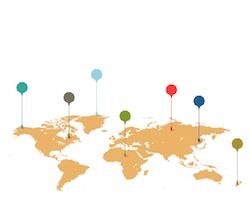Technology can revolutionize the way that healthcare services and information are transmitted around the globe in urban and especially rural or underdeveloped areas. SMS technology can track malnutrition in rural Ghana, and researchers have developed an innovative portable ultrasound that plugs into a laptop to keep medicine on the move. Developing countries offer unique and innovative technologies, too. Technology can make a major impact on healthcare in developing countries.
Mobile technology can help countries in underdeveloped areas advance the design of administrative systems in healthcare. Moving away from paperwork makes record keeping and transmission easier. Pilot programs help innovate healthcare technology in developing countries, but the proper framework and e-healthy strategy need putting in place first. A PWC report indicates that mobile health can save more than 1 million lives within the next five years in sub-Saharan Africa, not to mention what it could do for the rest of the world.
Increased Accuracy and Transparency
Bringing the internet and the cloud to multiple countries allow them to step away from paper to improve the accuracy in data processing and patient procedures and enable medical providers and governments step up in transparency and instill trust in patients regarding their healthcare. 87 percent of physicians use a smartphone or tablet in the office, and since the release of more intuitive touch technology, such as the first-generation iPhone, use of mobile tech in offices is on the rise.
The shift from paperwork to mobile improves accuracy and prioritizes time toward the patient. Children birthed outside hospitals can be counted in Uganda and Nigeria with the help of SMS, and delays for getting back HIV test results reduced from 45 days down to two in Malawi and Zambia. Combine mobile health with open access, and government transparency increases in healthcare delivery. Patients can report a lack of care and corruption. Why can’t health improvement shift in a symbiotic relationship with health technology?
Mobile technology can offer an intrinsic role in dealing with emergencies and growing health concerns in developing countries, such as the 2013 Ebola outbreak in West Africa. Future governments may track phones to collect data about patterns of movements to focus on high-risk areas but would need to enact policy on transparency and privacy. However, governments may better channel resources and provide for their public. With point-of-care tests, virus control gets restored or put into place rapidly, preventing an epidemic.
Government mistrust, poor infrastructure and no reliable power prevent developing countries from taking the road to innovation in both hands.
Reducing Healthcare Costs
Enrolling patients in clinical trials also provides access to quality healthcare, especially for patients in small communities who can’t afford to travel due to a lack of transportation or finances. Many patients also don’t know to look for clinical trials on specific medical websites, but technologies like VitalTrax help caregivers, physicians, patients and families find clinical trials globally in a language they understand. It’s hard for patients to decide what clinical trial may be best for them, and such technology offers transparency.
Mobile technology is more inclusive of others worldwide, and many developing countries get innovate about how they do what they do to support the patients within their care. 60 million have type 2 diabetes in India, 36 million suffer from hepatitis B and 2.6 million struggle with HIV. One Indian doctor created the Swasthya Slate, a portable device that records hepatitis B status, HIV status and blood glucose in addition to 30 more diagnostic tests.
Smartphone tech promises to reduce the costs of medical devices used every day. Imagine an ultrasound compatible with a smartphone, which exists and has revolutionized the point of care ultrasound (POCUS). With this device, doctors easily set central lines, diagnoses emergencies faster, scan pregnant women and guide injections.
The developing world leads medical technology in this way creatively. Smartphones are intuitive devices that allow for innovation especially when doctors in developing countries have to think on their feet. Doctors in countries like Kosovo, Indonesia, Sierra Leone and Ethiopia employ POCUS in resource-scarce environments, emergency situations and remote settings, all the quality tech for a fraction of what it costs major western hospitals and doctor offices.
Major technology doesn’t start in the West and travel to other areas of the globe. Many countries have unique sets of circumstances and characteristics that motivate them to look for affordable and creative costs to everyday concerns. General Electric’s talent designed a portable ultrasound that medical professionals can plug into a laptop. The device costs less than the traditional bulky mode and it’s usable in remote areas, and GE also has a handheld version that costs $8000 instead of $100,000.
These plug-in and handheld ultrasounds are now available in the United States. Innovation occurs around the globe, whether countries are rich or poor, but developed countries have many unique offerings that will change the future of health technology and care.







